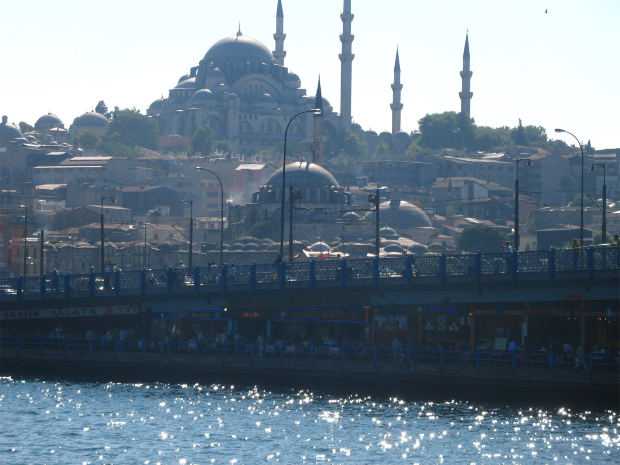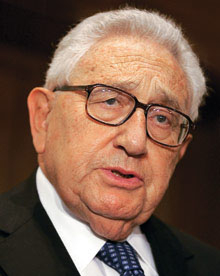By Andrew G. Bostom
AndrewBostom.org | Monday, March 30, 2009
In a recent blog, I described how a courageous modern “traditional liberal” politician, Geert Wilders, aptly warns of the dangers posed by the ancient, but living totalitarianism of Islam, an entirely unreformed, and unrepentant religio-political system.
Why does the Left-from the more vociferous, to the (outwardly) sober-openly embrace, or rationalize, or at very best ignore and fail to condemn-the totalitarian scourge of contemporary jihadism, and all its accompanying “sacralized” Islamic ugliness: genocidal hatred of non-Muslims, Muslim “apostate” freethinkers, and women?
Almost immediately after Bolshevism emerged as an important political ideology, with real power, Bertrand Russell understood its similarity to Islam. He made the following comparison between Islam and Bolshevism in his 1920, “Theory and Practice of Bolshevism“:
Bolshevism combines the characteristics of the French Revolution with those of the rise of Islam.
Marx has taught that Communism is fatally predestined to come about; this produces a state of mind not unlike the early successors of Muhammad.
Among religions, Bolshevism is to be reckoned with Mohammedanism rather than with Christianity and Buddhism. Christianity and Buddhism are primarily personal religions, with mystical doctrines and a love of contemplation. Mohammedanism and Bolshevism are practical, social, unspiritual, concerned to win the empire of the world.
Three decades later, sociologist Jules Monnerot’s “Sociology and Psychology of Communism” (first published in French in 1949) opened with a chapter describing Communism as, “The Twentieth-century Islam.” Monnerot noted that like its religious antecedent, Islam, “Communism takes the field both as a secular religion and as a universal State.[emphasis in the original]” He concludes the comparison by observing,
This merging of religion and politics was a major characteristic of the Islamic world in its victorious period. It allowed the head of a State to operate beyond his own frontiers in the capacity of commander of the faithful (Amir-al-muminin); and in this way a Caliph was able to count upon docile instruments, or captive souls, wherever there were men who recognized his authority. The territorial frontiers which seemed to remove some of his subjects from his jurisdiction were nothing more than material obstacles; armed force might compel him to feign respect for the frontier, but propaganda and subterranean warfare could continue no less actively beyond it.
Religions of this kind acknowledge no frontiers. Soviet Russia is merely the geographical center from which communist influence radiates; it is an ‘Islam’ on the march, and it regards its frontiers at any given moment…[I]t is not the first empire in which the temporal and public power goes hand in hand with a shadowy power which works outside its imperial frontiers to undermine the social structure of neighboring States. The Islamic East affords several examples of a like duality and duplicity. The Egyptian Fatimids, and later the Persian Safavids, were the animators from the heart of their own States, of an active and organizing legend, an historical myth, calculated to make fanatics and obtain their total devotion, designed to create in neighboring States an underworld of ruthless gangsters. The eponymous ancestor of the Safavids was a saint from whom they magically derived the religious authority in whose name they operated. They were Shi’is of Arabian origin, and the militant order they founded was dedicated to propaganda and ‘nucleation’ throughout the whole of Persia and Asia Minor. It recruited ‘militants’ and ‘adherents’ and ‘sympathizers’. These were the Sufis. As rulers their sympathies were recognized by other sovereigns in the same way that Stalin, head of the State, is recognized by other heads of States, and rightly, as the leader of world communism.
Jamie Glazov’s trenchant, timely analysis United in Hate: The Left’s Romance With Tyranny and Terror, elucidates how the contemporary Left-self-professed torch-bearers of “humanitarianism”-is so afflicted with moral and intellectual idiocy that it promotes, via activism, or apologetics-the genocidal aspirations of totalitarian Islam.
Glazov reminds us of Eric Hoffer’s seminal observations from “The True Believer,” contrasting those persons who possess “…a sense of fulfillment [and] think it is a good world and would like to conserve it as it is…,” with “…the frustrated [who] favor radical change.” Unfortunately, as Hoffer noted, the true believer’s desire for “radical change” is characteristically founded upon the nihilistic craving to “…be rid of an unwanted self…,” creating destructive mass movements which “…satisfy the passion for self-renunciation.”
Hoffer’s paradigm is deftly expanded upon by Glazov to explain the contemporary phenomenon of Leftist support for jihadists and jihadism:
In rejecting his own society, the believer spurns the values of democracy and individual freedom, which are anathema to him, since he has miserably failed to cope with both the challenges they pose and the possibilities they offer. Tortured by his personal alienation, which is accompanied by feelings of self-loathing, the believer craves a fairy-tale world where no individuality exists, and where human estrangement is thus impossible. The believer fantasizes about how his own individuality and self will be submerged within the collective whole.
…As history tragically recorded, this “holy cause” follows a road that leads not to an earthly paradise, but rather to an earthly hell in all of its manifestations. The political faith rejects the basic reality of the human condition-that human beings are flawed and driven by self-interest-and rests on the erroneous assumption that humanity is malleable and can be shaped into a more perfect form.
…[T]he new generation of believers found their own idols in the terror war. The romance with Islamism is just a logical continuation of the long leftist tradition of worshipping America’s foes.
An added ingredient in this equation is the Left’s sacred cow of multiculturalism. The believer cannot accept the truth about Islamism or much of Islam, because he would then have to concede that not all cultures are equal, and that some cultures (e.g., America’s, with its striving for equality) are superior to others (e.g., Islam’s structure of gender apartheid). For the believer to retain his sense of purpose and to avoid the collapse of his identity and community, such thoughts must be suppressed at all cost. Because he seeks to nurture his self-identification as a victim and to lose himself inside a totalitarian collective whole, he must deny the truth about the object of his worship, as believers of previous generations denied the truth about Stalin’s Russia, Mao’s China, and other totalitarian societies.
Because of these factors, the believer clings to a rigid Marxist view of the terror war, no matter how much empirical evidence proves that Islamist violence has absolutely nothing to do with economic inequality, class oppression, or Western exploitation. This is why, when Osama bin Laden and Abu Musab Al-Zarqawi justify their terror with references to the Koran, and when Zacarias Moussaoui casually explains in court that he was simply following the Koran’s directive that Muslims must make Islam the world’s superpower, the believer always turns a deaf ear.
This is a long tradition of the Left: progressives have always assumed that they understand the world much better than the people for whom they purport to speak. In terms of the terror war, there exists an obvious and profound racism in the believer’s disposition, since the implication is that Muslims and Arabs are not bright enough to understand their own circumstances, and therefore their explanations of their own actions cannot be taken seriously.
Thus while bin Laden, Zarqawi, and Moussaoui may insist that the holy jihad is motivated by the desire to spread sharia throughout the world, to erase individual freedom, and to kill, convert, or subjugate infidels, the Western leftists is constrained to rationalize that they are saying such things only because they have been hurt by capitalism and Western imperialism. As David Horowitz points out, the leftist holds the Marxist perspective that religion is nothing more than a thought structure rooted in suffering under capitalism. Once the oppression stops, the believer assumes, the Islamist conceptions of Allah and jihad (which the believer privately considers ridiculous but would never dare say so in public) will simply disappear. Believers, therefore, inevitably deny the Islamic dimension that the terrorists themselves insist is their impetus for terror.
Unlike any other book, Jamie Glazov’s remarkably lucid, succinct analysis explains the odious alliance between resurgent totalitarian Islam, and a large swath of the contemporary Left.
Reviews:
Phyllis Chesler
Ron Radosh
Alyssa Lappen
Kathy Shaidle
WorldNetDaily.com
Cheryl Malandrinos
Ben Furman
Andrew G. Bostom is a frequent contributor to Frontpage Magazine.com, and the author of The Legacy of Jihad, and the forthcoming The Legacy of Islamic Antisemitism.







